December 9, 2020
Search Results for: technology
December 8, 2020
Covid-19 creating career lockdown for younger workers
by Jayne Smith • News, Working culture, Working lives
 With many continuing to work remotely for the foreseeable future, new insights from Sharp claim that a significant number of European office workers are concerned for their career prospects, with over half (51 percent) anxious about issues such as keeping skills up to date, lack of training and career opportunities when thinking long term about the future of work. (more…)
With many continuing to work remotely for the foreseeable future, new insights from Sharp claim that a significant number of European office workers are concerned for their career prospects, with over half (51 percent) anxious about issues such as keeping skills up to date, lack of training and career opportunities when thinking long term about the future of work. (more…)
December 3, 2020
Hybrid working presents us with a once in a generation opportunity
by Michael Cockburn • Comment, Coworking, Flexible working, Technology
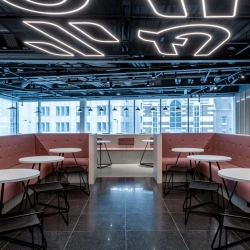 In the face of the revolutionary and long-lasting changes to workplaces across the world resulting from the pandemic, some commentators have suggested that the wide-spread necessity of adopting remote working practices may have made the office obsolete. However, such a dramatic upheaval to the very foundation of the workplace and working dynamic won’t come without a cost, and new data suggests that perhaps the office isn’t the dinosaur many assumed, but still a central pillar to effective businesses as part of a hybrid working strategy. (more…)
In the face of the revolutionary and long-lasting changes to workplaces across the world resulting from the pandemic, some commentators have suggested that the wide-spread necessity of adopting remote working practices may have made the office obsolete. However, such a dramatic upheaval to the very foundation of the workplace and working dynamic won’t come without a cost, and new data suggests that perhaps the office isn’t the dinosaur many assumed, but still a central pillar to effective businesses as part of a hybrid working strategy. (more…)
December 3, 2020
New think tank seeks to influence thinking on disability iat work
by Neil Franklin • News, Wellbeing
December 2, 2020
Creative firms have most to lose from a loss of serendipity
by Gary Chandler • Comment, Workplace design
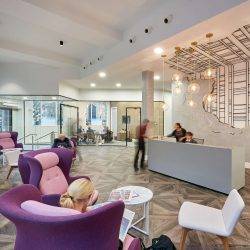 Most of the analysis about the effects of the 2020 pandemic on people’s working lives has tended to involve grand statements about new normals and the death of this or that, as if everybody wants the same things, has the same personal circumstances, works in the same ways, the same places and same sectors. (more…)
Most of the analysis about the effects of the 2020 pandemic on people’s working lives has tended to involve grand statements about new normals and the death of this or that, as if everybody wants the same things, has the same personal circumstances, works in the same ways, the same places and same sectors. (more…)
December 2, 2020
Cornerstone Innovation Lab unites data scientists across the company to advance AI in the workplace
by Freddie Steele • Company news
 Cornerstone OnDemand, Inc. (NASDAQ: CSOD), has announced the formation of the Cornerstone Innovation Lab for AI, a new centre of excellence within the company composed of data scientists and machine learning experts who specialise in innovating practical and ethical ways to apply AI technology to the workplace. (more…)
Cornerstone OnDemand, Inc. (NASDAQ: CSOD), has announced the formation of the Cornerstone Innovation Lab for AI, a new centre of excellence within the company composed of data scientists and machine learning experts who specialise in innovating practical and ethical ways to apply AI technology to the workplace. (more…)
November 27, 2020
Generational stereotypes unhelpful when it comes to digital behaviour
by Jayne Smith • News, Technology, Working culture
 Windsor Telecom decided to take a look into the UK’s current working styles and trends to discover what tools and technologies are needed to bridge the generational gaps in the workplace. 341 people where surveyed to understand if their technology generation matched up with the generation they were born into. (more…)
Windsor Telecom decided to take a look into the UK’s current working styles and trends to discover what tools and technologies are needed to bridge the generational gaps in the workplace. 341 people where surveyed to understand if their technology generation matched up with the generation they were born into. (more…)
November 26, 2020
People still struggling with shift to remote living
by Jayne Smith • News, Technology, Wellbeing
 A lack of balance through lockdown has been felt most dramatically by Brits living in house shares according to new research released by Microsoft Windows. The research claims that over 40 percent of people living with house mates, friends or professionals are finding it increasingly difficult to destress and unwind after a long and challenging day; while a further 1 in 5 of the UK population admit that work and play has become blurred in 2020. (more…)
A lack of balance through lockdown has been felt most dramatically by Brits living in house shares according to new research released by Microsoft Windows. The research claims that over 40 percent of people living with house mates, friends or professionals are finding it increasingly difficult to destress and unwind after a long and challenging day; while a further 1 in 5 of the UK population admit that work and play has become blurred in 2020. (more…)
November 25, 2020
Location of workplace becomes more important to workers
by Jayne Smith • Flexible working, News, Working culture
 The location of a potential employer’s workplace is becoming more important to workers – despite a surge in people working remotely, according to outplacement firm Randstad RiseSmart UK. Almost half (49 percent) of workers now say location is an important factor in choosing an employer, up from just over a third (35 percent) pre-pandemic. (more…)
The location of a potential employer’s workplace is becoming more important to workers – despite a surge in people working remotely, according to outplacement firm Randstad RiseSmart UK. Almost half (49 percent) of workers now say location is an important factor in choosing an employer, up from just over a third (35 percent) pre-pandemic. (more…)
November 24, 2020
Digital skills gap poses major economic threat, Microsoft study claims
by Neil Franklin • News, Technology
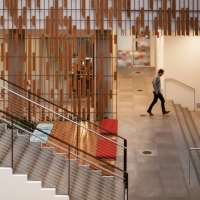 The UK’s digital skills gap could pose a risk to economic recovery, new research from Microsoft claims, with over three-quarters of UK leaders citing a large digital talent pool as essential to driving UK competitiveness. The study, Unlocking the UK’s potential with digital skills, was conducted in partnership with Dr Chris Brauer at Goldsmiths, University of London to assess the UK’s skills gap and provide practical guidance for organisations on how to tackle it. It predicts the rise of a “Next Gen Worker” that is empowered by low-code and no-code technology, but also finds that a failure to embrace technological skills could leave companies struggling to compete on the global stage. (more…)
The UK’s digital skills gap could pose a risk to economic recovery, new research from Microsoft claims, with over three-quarters of UK leaders citing a large digital talent pool as essential to driving UK competitiveness. The study, Unlocking the UK’s potential with digital skills, was conducted in partnership with Dr Chris Brauer at Goldsmiths, University of London to assess the UK’s skills gap and provide practical guidance for organisations on how to tackle it. It predicts the rise of a “Next Gen Worker” that is empowered by low-code and no-code technology, but also finds that a failure to embrace technological skills could leave companies struggling to compete on the global stage. (more…)
November 23, 2020
The workplace to become more human-centric than ever, as priorities change
by Jayne Smith • Flexible working, News, Working culture, Working lives
 Companies are facing complex performance challenges as the COVID-19 resurgence heightens the need to reinvigorate employee engagement. JLL’s new “Human Experience” report explores these changing workforce dynamics and expectations in a post-pandemic world and offers insights for how forward-thinking companies can reimagine their approach to managing their people and workplaces to stay ahead in 2021. (more…)
Companies are facing complex performance challenges as the COVID-19 resurgence heightens the need to reinvigorate employee engagement. JLL’s new “Human Experience” report explores these changing workforce dynamics and expectations in a post-pandemic world and offers insights for how forward-thinking companies can reimagine their approach to managing their people and workplaces to stay ahead in 2021. (more…)








 Heightened anxiety during the Covid-19 pandemic has led to employees working longer hours and taking fewer sick days, all the while becoming less fulfilled by work and life, according to the latest analysis from
Heightened anxiety during the Covid-19 pandemic has led to employees working longer hours and taking fewer sick days, all the while becoming less fulfilled by work and life, according to the latest analysis from 
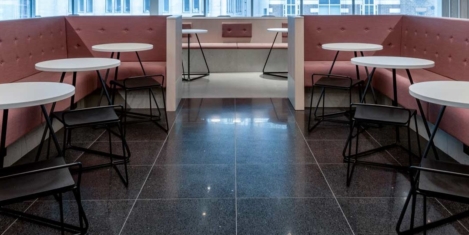

 A new think tank has launched today to mark the United Nations’ International Day of Persons with a Disability. Called ‘
A new think tank has launched today to mark the United Nations’ International Day of Persons with a Disability. Called ‘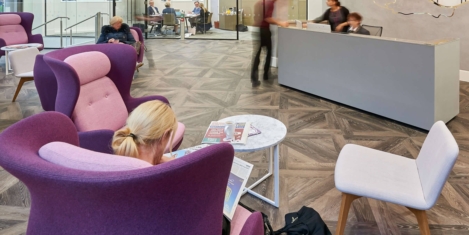















December 4, 2020
The lost art of office furniture peacocking and the growing mental health crisis at work
by Mark Eltringham • Comment, Technology, Wellbeing, Workplace design